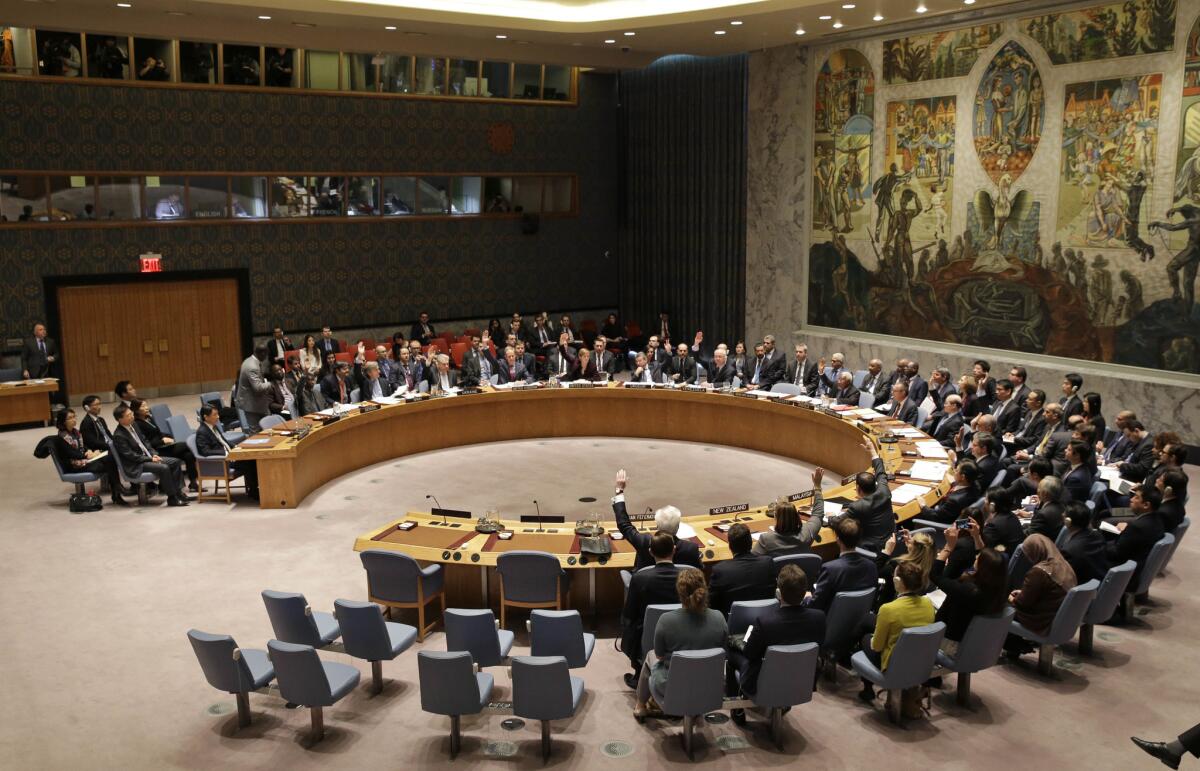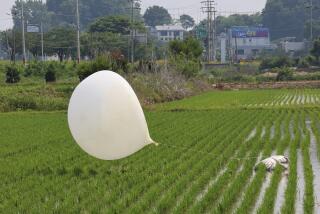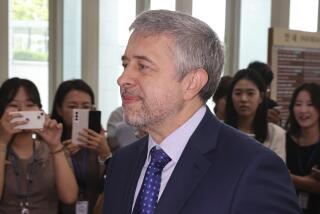U.N. approves toughest sanctions on North Korea in 20 years

The United Nations Security Council votes on a resolution during a meeting at U.N. headquarters, Wednesday, March 2, 2016.
The 15-member United Nations Security Council voted unanimously Wednesday to impose sweeping new sanctions on North Korea, including mandatory cargo inspections and a ban on exports of most natural resources, in response to its recent nuclear and ballistic missile tests.
The penalties were approved after seven weeks of negotiations between the United States and China, North Korea’s largest economic and political patron. Beijing ultimately agreed to try to pressure the reclusive government in Pyongyang more stringently than ever before.
Secretary of State John F. Kerry, who called the sanctions the toughest in more than two decades, said the goal is to “hold the regime to account for its increasingly provocative behavior” and its growing threat to regional security.
The resolution requires inspections by U.N. member nations of all cargo going to or from North Korea by air, sea or land. It bars the country’s imports of aviation fuel, which will ground its aircraft, and sharply limits exports of coal, iron, gold and titanium.
It tightens an arms embargo to include light weapons, terminates banking relationships with outside institutions, and bans teaching North Koreans overseas in advanced physics, aerospace engineering and other sensitive fields.
The resolution also specifically bans North Korea from using ballistic missile technology, even if it claims – as Pyongyang has repeatedly in the past – that is putting a satellite in orbit. It also freezes overseas assets of 16 individuals and 12 government agencies and banks.
“The international community, speaking with one voice, has sent Pyongyang a simple message: North Korea must abandon these dangerous programs and choose a better path for its people,” President Obama said in a statement after Wednesday’s vote.
NEWSLETTER: Get the day’s top headlines from Times Editor Davan Maharaj >>
North Korea launched “a few” short-range projectiles Thursday morning local time in what appeared to be a statement of displeasure with the sanctions, South Korea’s Defense Ministry said. A ministry official, speaking on condition of anonymity under department guidelines, said the projectiles were launched from the area around Wonsan on North Korea’s east coast. It was unclear where they landed.
The Security Council has approved resolutions targeting North Korea’s nuclear and ballistic missile programs four times in the last decade. But enforcement was weak, and the sanctions contained enough loopholes that Pyongyang was able to repeatedly defy them.
It most recently tested an underground nuclear device on Jan. 6 that it said was a hydrogen bomb, a claim Western experts disputed. On Feb. 7, it put a small satellite in space in a rocket launch that the Obama administration said was a mask for a ballistic missile test.
Beijing has resisted tightening sanctions for several years, or enforcing some of those already in place. Chinese authorities worry that the economy of its nuclear-armed neighbor could collapse, creating turmoil on its borders.
But North Korean leader Kim Jong-un’s continued pursuit of nuclear weapons apparently angered Beijing. The most recent nuclear test came on the eve of the Chinese New Year and after President Xi Jinping’s government had explicitly asked Pyongyang to refrain from a test.
During the negotiations with Washington, China made clear it did not want to impose measures so punitive that it could jeopardize the stability of North Korea, or harm its already impoverished population.
The resolution emphasizes that the new sanctions are not intended to cause “adverse humanitarian consequences” for civilians.
North Korea did not immediately issue any statement in response to the Security Council vote.
Earlier this week, it said it would no longer take part in U.N. Human Rights Council sessions examining its abysmal human rights record. Foreign Minister Ri Su-yong accused the council of “politicization, selectivity and double standards” and of “singling out” North Korea for criticism.
Join the conversation on Facebook >>
ALSO
Australian cardinal admits ignoring boy’s complaint about a sexually abusive priest
Blunder turns deadly when two Israeli soldiers using Waze drive into a Palestinian camp
Developers plan one-stop medical facility in Tijuana convenient to Americans
More to Read
Sign up for Essential California
The most important California stories and recommendations in your inbox every morning.
You may occasionally receive promotional content from the Los Angeles Times.










